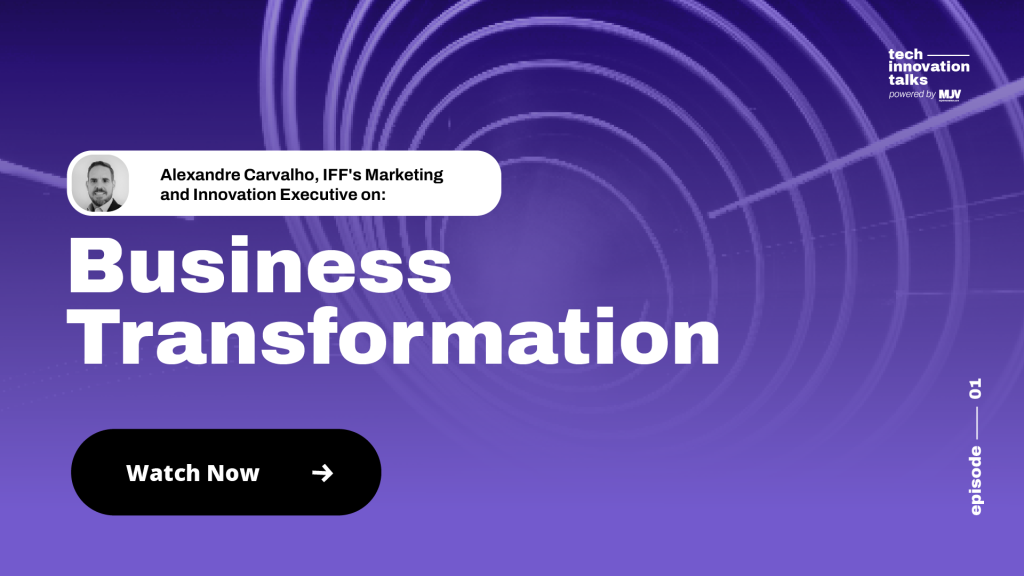IFF Executive on Business Transformation: “It’s very important to keep asking why you exist as a company”
Businesses are directly impacted by changes in society, and this leaves a legacy of a cultural broth that lasts. In this week’s episode of TechInnovation Talks, we’re joined by Alexandre Carvalho from International Flavors & Fragrances to discuss and address several aspects of business transformation.
Over the last few years, the pace of transformation has skyrocketed. And not just digital transformation either: cultural transformation, political transformation, and yes, you guessed it, business transformation. In this episode of Tech Innovation Talks, we sat down with Alexandre Carvalho from IFF and our very own Rebecca Diaz to talk about just that.
Business transformation means being “purpose driven”
The opening quote above is something we at MJV take very seriously. Having a well-crafted, thoughtful, and truthful purpose is something that you need in order to grow as a business. It might seem like just another facetious corporate strategy to many, but the honest truth is that every single Fortune-500 company has a detailed purpose that is not only clearly stated to the public but also permeates all aspects of its business.
But how does having a purpose relate to business transformation? Rebecca Diaz explains: “Business Transformation speaks to changing how the company thinks and how that’s reflected across the company as a whole. And the best way to drive that is through a shared company purpose.“
Still on this line, Alexandre states:
“Nowadays, I think it’s very important that we highlight the importance of having a really well-articulated purpose. (…) Always asking why you exist as a company.“
Alexandre Carvalho, Marketing & Innovation Executive for IFF.
Transformation requires changes in habits, strategy, and tools, but the number one thing that needs to change for adaptation to truly take root is a mindset change.
There are several ways to accomplish this, but the most effective seems to be through corporate culture. But sometimes, change doesn’t come from inside the company.
Cultural Changes & The Low-Touch Hybrid Post-Pandemic Model
It’s hard to have any conversation regarding business transformation without talking about the pandemic. A moment when companies around the world pushed so hard for transformation that it almost had to happen overnight.
Peter Drucker, one of the business world’s most famous gurus, once said: “Culture eats strategy for breakfast.” That’s because its role in business is evident.
Businesses are directly impacted by changes in society, and this leaves a legacy of a cultural broth that lasts, like post-pandemic remote culture.
This change is something that Alexandre Carvalho is familiar with:
“When you have a high dependence on face-to-face interactions with customers, like in the B2B space, how do you do this in a digital way when you are used to doing this face-to-face? (…) Two years ago, I used to fly to China, for example, for one-hour meetings with customers. And this used to take the whole week. Nowadays, we do 3, 4 meetings with Asia in the same week.“
Alexandre Carvalho, on the post-pandemic changes.
He continues:
“So, in a way, we don’t have the energy to be face-to-face anymore. But this transformation, I think, is gonna stay because people realize that this is possible. Because in the past, people were offended if you didn’t go in person. They want the presence there; it’s an important project. But now I think there is much more openness to this kind of way of working, and technology is going to play a critical role.“
Here, Alexandre touches on a unique and sometimes overlooked aspect of business transformation. Companies get so used to doing something in a certain way that no one even questions the absurdity of traveling 13 hours by plane just to have a one-hour meeting. But in that same light, once a change is enacted and the business transformation is complete, people completely forget that they were willing to do that in the first place.
Convenience and habit are two aspects of business that are processed in our subconscious. When something is convenient, we don’t think about it, and when something is a habit, even if it’s inconvenient, we’re already used to it. And while remote meetings with long-distance clients are a no-brainer to us now. It takes something like a global pandemic to finally push some industries to transform the way they do business.
This is only a snippet of this episode of TechInnovation Talks; in fact, this is merely pulled from the first five minutes of the interview. If you want to see more – and trust us, there is much more to see – we suggest you check out the full episode here. For more top technology and innovation content, visit our YouTube channel.
Back
